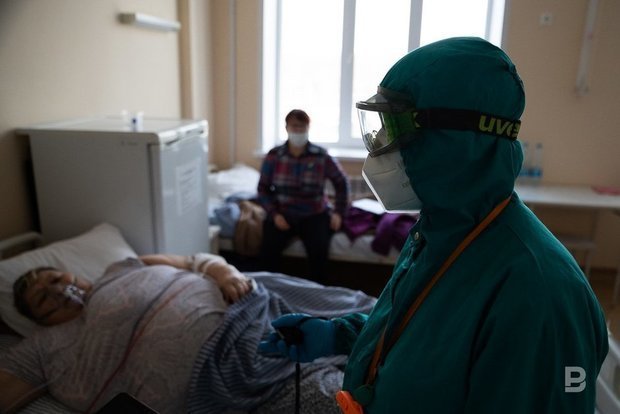‘It is incomparably less than it was a year ago’: Tatarstan's chief infectious disease specialist on coronavirus cases
The chief freelance infectious disease specialist of the Ministry of Healthcare of Tatarstan, Khalit Khaertynov, shared with Realnoe Vremya his opinion on the current epidemic situation in the republic. According to him, COVID-19 is still there, and the decrease in morbidity should not be misleading. He also spoke about other common diseases in the republic.
The pandemic is still there
COVID-19 is still one of the most frequent diseases in Tatarstan — as in other regions of the country. In recent years, the situation with coronavirus in terms of hospitalisation has improved significantly, says Khalit Khaertynov. He compares the situation not with the most “difficult” year 2020, but with the period between 2021 and 2022 — then the number of infected was much higher.

Nevertheless, despite the positive dynamics, one should not relax, the infectious disease specialist is sure. Recently, there has been a trend towards an increase in the incidence of COVID-19. This is explained by the appearance of the strains such as Omicron or Kraken.
“When a new subtype appears, it causes a slight increase in morbidity. Therefore, the number of cases has increased, including those hospitalised in temporary infectious diseases hospitals. Although I will emphasise, this number is incomparably less than what it was a year ago," Khaertynov told Realnoe Vremya.
Therefore, the end of the pandemic shouldn't be expected yet — at least in the near future, he said.

Besdies, Tatarstan residents often get sick with the flu. Recently, there has also been an increase in the incidence of this infection. According to the interlocutor, at first influenza A was circulating in the republic, but then it was replaced by a type B virus. It is the last type of the flu that the residents of Tatarstan have been getting sick in recent months.
According to open sources, the type A virus is capable of infecting both humans and animals. Its varieties are “Avian influenza” and “Swine influenza”. Influenza A has a severe and moderate form of severity and, as a rule, it grows to a pandemic. Such outbreaks occur once every 2-3 years. Type A flu is the most dangerous type. It is insidious in that it constantly mutates and changes the antigenic composition.
Type B virus can only be transmitted from person to person. This species is able to change, however, it does not spread to the level of epidemics and most often has a local character. At risk are those patients whose immunity is weakened, namely children and the elderly, pregnant women, as well as people with chronic pathologies.
Less popular diseases
As Khalit Khaertynov noted, Tatarstan citizens are also infected with other diseases. Hemorrhagic fever with renal syndrome (HFRS) has been detected in some residents of the republic.
This is a natural focal viral disease, the characteristic signs of which are fever, intoxication, increased bleeding and kidney damage (nephrosonephritis). Its incubation period lasts from 10 to 45 days. As a rule, the patient has several stages of the disease.

Traditionally, the incidence of rotavirus infection increases at this time of year. This is one of the most highly contagious infectious diseases, which mainly affects the gastrointestinal tract. It is also called “intestinal flu”. Now it is children who get infected with it most often:
“They just show growth in the cold season. This is a seasonal infection, unlike other intestinal infections, its growth is noted precisely in the cold season," the specialist noted.
Isolated cases and outlook for the future
Even in Tatarstan, isolated cases of measles have been recorded. This is a highly contagious viral infectious disease, after which a person develops a stable immunity. Measles mainly affects children aged 2 to 5 years. Measles in adults is quite rare. Most often it occurs in people who have not been vaccinated.
The patient feels general weakness and ache in the body, runny nose, fever, and severe headache. They may also have a sore throat when swallowing and inflammation of the mucous membrane of the eyes.

As Khalit Khaertynov noted, an outbreak of measles has recently been recorded in Samara Oblast and Volgograd Oblast. In the republic, according to him, there is no such situation now.
“We are mainly talking about brought cases. It just says that you need to be attentive and vigilant about the possible bringing of measles," the infectious disease specialist added.
How the epidsituation will develop in the future, the specialist does not know for sure. He noted that the emergence of new COVID-19 strains has made it more contagious, but less aggressive. It is possible that in the near future people will get infected with it again. At the same time, with a high probability, a large number of Tatarstan residents will be ill with it in a mild form. But the coronavirus still poses a serious danger to the elderly.